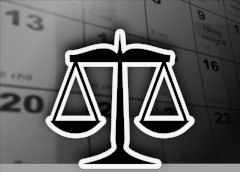LICADHO Condemns Violence in Kampong Speu
Published on 10 June 2011LICADHO strongly condemns the violent confrontation yesterday in Kampong Speu province, where hundreds of armed police and villagers clashed over a land dispute. At least 10 people were injured on both sides, including seven seriously.
Regrettably, the incident may be a sign of things to come, as more and more ordinary Cambodians are pushed aside by a development agenda designed to enrich the elite.
"Once again we see armed forces mobilized to protect private interests, at the expense of the public interest," said LICADHO Director Naly Pilorge. "One rich man's minor business deal is worth more than the homes, livelihoods, and lives of hundreds of poor villagers. This is the reality of Cambodia today."
The clash was the culmination of a longstanding dispute over a 65-hectare parcel of land. Eighty-eight families claim they have lived on the land since the early 1980s. The dispute started after military officials had sold the land to the Taiwanese-owned Meng Keth Company, which now claims that it owns the land. The dispute wound its way through the court system since 2004, until the Supreme Court finally ruled against the villagers in December 2009. Yesterday's clash came after prosecutor Kuth Sopheang led a force of hundreds of armed police and military police in an attempt to enforce the Supreme Court's verdict.
The morning began with villagers blocking National Road 51 in anticipation of meeting the authorities. The road passes next to their village. The advancing police forces, however, avoided the direct route to the village, choosing instead to advance slowly via a back road that passed through rice paddies and scrub brush.
The police began reaching the village at about 11 a.m.; by 1 p.m. the entire force had amassed at the edge of the village. Villagers then assembled 300 meters away. A brief standoff ensued, during which two explosions were heard. Hand-to-hand combat then erupted across several hectares of rice fields. Police eventually fled after encountering fierce resistance, but not before firing at least 52 shots. The toll included seven injured villagers, five of whom were hospitalized, and three injured police, including one military police officer who was hospitalized.
LICADHO condemns the violence on both sides of this dispute, and deeply regrets that it came to this. The violence was regrettable precisely because it was so foreseeable. And in this situation, the authorities - in particular the prosecutor charged with enforcing the eviction order - bore a moral and legal obligation to avoid the violence.
Word of the pending police action spread through the community on June 8, and it was publically reported that 400 villagers were preparing to defend their property with stones, knives, machetes and sticks. There were clear signs that the confrontation would be violent, but the prosecutor chose to go ahead. Despite this, the prosecutor pressed ahead, showing up with armed police, tear gas, military trucks, dump trucks and bulldozers.
Signs of impending violence were also visible when the authorities arrived on site. Villagers were armed and ready for battle. The prosecutor had yet another opportunity to turn back; LICADHO and the UN Office for the High Commissioner for Human Rights urged him to cease the operation. Unfortunately, he refused.
"The authorities had numerous opportunities over several years to avoid this," said LICADHO President Pung Chhiv Kek. "They could have avoided the dubious sale of the villagers' the land. They could have reversed the sale at both the appeals court and the Supreme Court. They could have paid proper and just compensation. And they could have continued negotiations instead of sending in armed forces. If the authorities did just one of these things, yesterday's violence could have been avoided."
The villagers' desperation also speaks to a deeper problem in Cambodia: the total lack of legal recourse for those who are not in positions of privilege. The villagers, in fact, attempted to use legal means to resolve their dispute and protect their rights, including the courts. But they were simply brushed aside.
"They have been abused by the system at every step of the way - abused by private interests, by armed forces, by the prosecutor and by the courts," Pilorge said. "They are at the end of their rope. They have nothing left to lose. What do you expect them to do?"
Cambodia has seen a rise in violence associated with land disputes in recent years. The situation is often the same: Disenfranchised people, who have lost everything and have no legal recourse, resort to drastic means. LICADHO is concerned that the situation will continue to deteriorate unless the authorities do something to address the root causes of the problem. That means ending illegal evictions, listening to the voices of ordinary people and pursuing development for all, not just a select few.
"We have had enough violence in Cambodian history," said Pung Chhiv Kek. "It's time now for the Cambodian government, Cambodian people and civil society to work together without using violence. The government's goal must be harmonious development for the benefit of all people, not just a small minority."
LICADHO urges the authorities to refrain from further attempts at settling this land dispute through violence. Instead urges peaceful negotiation with the 88 families.
LICADHO also calls for an investigation by the Supreme Council of Magistracy into the implementation of the court order, which went forward despite foreseeable violence.
For more information, please contact:
▪ LICADHO President PUNG Chhiv Kek, 012 802 506
▪ LICADHO Technical Supervisor Am Sam Ath, 012 327 770
PDF: Download full statement in English - Download full statement in Khmer
- Topics
- Land rights







